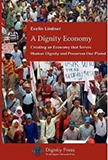 A Dignity Economy: Creating an Economy That Serves Human Dignity and Preserves Our Planet (2012) by Evelin Lindner
. CONTENTS: Part I: Where Do We Stand? Where Might We Go Chapter 1: While Critical Voices Get Louder, a Sense of Helplessness Prevails; Chapter 2: Let Us Join Hands and Dig Up the Facts!; Chapter 3: Where Might We Go? Toward a Dignity Transition Part II: Dignity or Humiliation? That Is the Question! Chapter 4: When Scarcity and Environmental Degradation Become Systemic; Chapter 5: When Mistrust Becomes Ubiquitous; Chapter 6: When Abuse Becomes a Means of “Getting Things Done;” Chapter 7: When Fear Becomes Overwhelming and Debilitating; Chapter 8: When False Choices Crowd out Important Choices; Chapter 9: When Our Souls Are Injured by the Homo Economicus Model; Part III: What Should We Do? Let Us Unite As a Human Family! Chapter 10: We Need a Panoply of New Strategies for Dignism!; Chapter 11: We Need to Humanize Globalization with Egalization!; Chapter 12: We Need Many More Voices and a Clear Direction!; Appendix I: Quotes; Appendix II: Selected Publications.
A Dignity Economy: Creating an Economy That Serves Human Dignity and Preserves Our Planet (2012) by Evelin Lindner
. CONTENTS: Part I: Where Do We Stand? Where Might We Go Chapter 1: While Critical Voices Get Louder, a Sense of Helplessness Prevails; Chapter 2: Let Us Join Hands and Dig Up the Facts!; Chapter 3: Where Might We Go? Toward a Dignity Transition Part II: Dignity or Humiliation? That Is the Question! Chapter 4: When Scarcity and Environmental Degradation Become Systemic; Chapter 5: When Mistrust Becomes Ubiquitous; Chapter 6: When Abuse Becomes a Means of “Getting Things Done;” Chapter 7: When Fear Becomes Overwhelming and Debilitating; Chapter 8: When False Choices Crowd out Important Choices; Chapter 9: When Our Souls Are Injured by the Homo Economicus Model; Part III: What Should We Do? Let Us Unite As a Human Family! Chapter 10: We Need a Panoply of New Strategies for Dignism!; Chapter 11: We Need to Humanize Globalization with Egalization!; Chapter 12: We Need Many More Voices and a Clear Direction!; Appendix I: Quotes; Appendix II: Selected Publications.
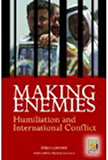 Making Enemies:
Humiliation and International Conflict (2006) by Evelin Lindner
CONTENTS Part I: Humiliation at Work in the Mind Chapter 1: The Mental Landscape; Chapter 2: Once the Cure, Now the Disease; Chapter 3: Globalization and Egalization; Part II: Humiliation at Work in the World Chapter 4: Humiliation and Misunderstanding; Chapter 5: Humiliation and Conflict; Chapter 6: Humiliation and Terrorism; Part III: Why Humiliation Doesn’t Work Chapter 7: The Humiliation Addiction; Chapter 8: The Humiliation Antidote; Chapter 9: The Future of Humiliation.
Making Enemies:
Humiliation and International Conflict (2006) by Evelin Lindner
CONTENTS Part I: Humiliation at Work in the Mind Chapter 1: The Mental Landscape; Chapter 2: Once the Cure, Now the Disease; Chapter 3: Globalization and Egalization; Part II: Humiliation at Work in the World Chapter 4: Humiliation and Misunderstanding; Chapter 5: Humiliation and Conflict; Chapter 6: Humiliation and Terrorism; Part III: Why Humiliation Doesn’t Work Chapter 7: The Humiliation Addiction; Chapter 8: The Humiliation Antidote; Chapter 9: The Future of Humiliation.
Gender, Humiliation, and Global Security:
Dignifying Relationships from Love, Sex, and Parenthood to World Affairs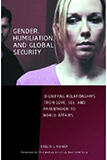 (2010) by Evelin Lindner. CONTENTS: Foreword by Archbishop Emeritus Desmond Mpilo Tutu Part I: Gender, Humiliation, and Lack of Security in Times of Transition Chapter 1: Love or Abuse—How Culture Frames Emotions; Chapter 2: Humility or Humiliation—How Humiliation Became a Violation; Chapter 3: Men Above Women—How Gender Became Segregated and Ranked; Part II: Gender, Humiliation, and Lack of Security in the World Today Chapter 4: Gender Roles—How They Can Humiliate; Chapter 5: Humiliation Addiction—How Dangerous It Is; Chapter 6: The Humiliation Antidote—How About the Audacity of Love; Part III: What We Can Do: Global Security through Love and Humility in the Future Chapter 7: Love and Sex—How We Can Free Them; Chapter 8: Parenthood—How We Can Rescue It; Chapter 9: Globalization—How Co-Egalization Can Dignify Us All; Afterword by Linda M. Hartling, in Honor of Jean Baker Miller and Donald C. Klein.
(2010) by Evelin Lindner. CONTENTS: Foreword by Archbishop Emeritus Desmond Mpilo Tutu Part I: Gender, Humiliation, and Lack of Security in Times of Transition Chapter 1: Love or Abuse—How Culture Frames Emotions; Chapter 2: Humility or Humiliation—How Humiliation Became a Violation; Chapter 3: Men Above Women—How Gender Became Segregated and Ranked; Part II: Gender, Humiliation, and Lack of Security in the World Today Chapter 4: Gender Roles—How They Can Humiliate; Chapter 5: Humiliation Addiction—How Dangerous It Is; Chapter 6: The Humiliation Antidote—How About the Audacity of Love; Part III: What We Can Do: Global Security through Love and Humility in the Future Chapter 7: Love and Sex—How We Can Free Them; Chapter 8: Parenthood—How We Can Rescue It; Chapter 9: Globalization—How Co-Egalization Can Dignify Us All; Afterword by Linda M. Hartling, in Honor of Jean Baker Miller and Donald C. Klein.
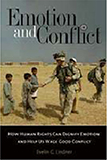 Emotion and Conflict: How Human Rights Can Dignify Emotion and Help Us Wage Good Conflict (2009) by Evelin Lindner CONTENTS: Part I: How Emotions Can Fuel Conflicts; Chapter 1: What Are Emotions?; Chapter 2: How Emotions Affect Conflicts; Chapter 3: How Contexts Affect Emotions and Conflicts; Part II: How Emotions Can Maximize and Minimize Conflicts Chapter 4: What is Humiliation?; Chapter 5: How History and Culture Can Humiliate; Chapter 6: How Human Rights Can Dignify; Part III: How We Can Dignify Our Emotions and Transcend Our Conflicts Chapter 7: How to Regulate Our Emotions; Chapter 8: How to Reinvent Our Contexts; Chapter 9: How to Dignify Our Emotions and Transcend Conflicts.
Emotion and Conflict: How Human Rights Can Dignify Emotion and Help Us Wage Good Conflict (2009) by Evelin Lindner CONTENTS: Part I: How Emotions Can Fuel Conflicts; Chapter 1: What Are Emotions?; Chapter 2: How Emotions Affect Conflicts; Chapter 3: How Contexts Affect Emotions and Conflicts; Part II: How Emotions Can Maximize and Minimize Conflicts Chapter 4: What is Humiliation?; Chapter 5: How History and Culture Can Humiliate; Chapter 6: How Human Rights Can Dignify; Part III: How We Can Dignify Our Emotions and Transcend Our Conflicts Chapter 7: How to Regulate Our Emotions; Chapter 8: How to Reinvent Our Contexts; Chapter 9: How to Dignify Our Emotions and Transcend Conflicts.
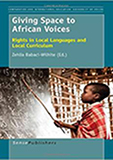 Giving Space to African Voices: Rights in Local Languages and Local Curriculum (2014) Zehlia Babaci-Wilhite (Ed.) CONTENTS: Part I: Localization of Instruction and Curriculum Development. Localization of Instruction as a Right in Education: Tanzania and Nigeria Language-in-Education ́s Policies, Zehlia Babaci-Wilhite & Macleans A. Geo-Jaja; Language, Learning, and Education for All in Africa, Sam Mchombo; Voices in Development Struggles in the South: Experiences in Education in Tanzania, 1961-2011, Abel G. Ishumi; Shaping Muslim Curriculum in Kenya, Ousseina Alidou Part II: Rights to Education Rights to Quality Education (Translated From French To English by, Zehlia Babaci-Wilhite), Samir Amin; Enhancing Capacities for Improving Quality Education Assessment Practices, Justinian C. J. Galabawa; Rethinking Quality Education in Tanzania ́s Classrooms, Ladislaus M. Semali; Appropriate Language in Education: The Strategy for National Development in Nigeria, Jerome Ikechukwu Okonkwo; Part III: Linguistic Rights in Education Examining Ugandan and Malawian Language of Instruction Policies from a Linguistic Human Rights Perspective: Past and Present Challenges and Realities, Ismail S. Gyagenda & Wardah M. Rajab-Gyagenda; Violation for Linguistic Rights: The Effects onTanzanian Education System and Work Places, Julitha C. John; Infusing a Rights-Based Approach in Initial Teacher Education in Postcolonial Zanzibar: Critical Insiders ́ Perspectives, Maryam J. Ismail; The Local and the Global in Zanzibar’s Educational Policy: Implications for Children ́s Rights in Education, Zehlia Babaci-Wilhite; Afterword: Paulo Freire ́s Legacy to World Education Rights, Francisco Gomes De Matos
Giving Space to African Voices: Rights in Local Languages and Local Curriculum (2014) Zehlia Babaci-Wilhite (Ed.) CONTENTS: Part I: Localization of Instruction and Curriculum Development. Localization of Instruction as a Right in Education: Tanzania and Nigeria Language-in-Education ́s Policies, Zehlia Babaci-Wilhite & Macleans A. Geo-Jaja; Language, Learning, and Education for All in Africa, Sam Mchombo; Voices in Development Struggles in the South: Experiences in Education in Tanzania, 1961-2011, Abel G. Ishumi; Shaping Muslim Curriculum in Kenya, Ousseina Alidou Part II: Rights to Education Rights to Quality Education (Translated From French To English by, Zehlia Babaci-Wilhite), Samir Amin; Enhancing Capacities for Improving Quality Education Assessment Practices, Justinian C. J. Galabawa; Rethinking Quality Education in Tanzania ́s Classrooms, Ladislaus M. Semali; Appropriate Language in Education: The Strategy for National Development in Nigeria, Jerome Ikechukwu Okonkwo; Part III: Linguistic Rights in Education Examining Ugandan and Malawian Language of Instruction Policies from a Linguistic Human Rights Perspective: Past and Present Challenges and Realities, Ismail S. Gyagenda & Wardah M. Rajab-Gyagenda; Violation for Linguistic Rights: The Effects onTanzanian Education System and Work Places, Julitha C. John; Infusing a Rights-Based Approach in Initial Teacher Education in Postcolonial Zanzibar: Critical Insiders ́ Perspectives, Maryam J. Ismail; The Local and the Global in Zanzibar’s Educational Policy: Implications for Children ́s Rights in Education, Zehlia Babaci-Wilhite; Afterword: Paulo Freire ́s Legacy to World Education Rights, Francisco Gomes De Matos
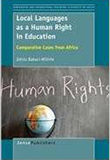 Local Languages as a Human Right in Education: Comparative Cases from Africa (2014) by Zehliai Baboc-Whilite CONTENTS: Chapter 1: Introduction; Chapter 2: Languages Issues in Africa Language Imperialism in Africa ;The East Africa Lingua Franca; Local Languages for Knowledge Acquisition and Cultural Identity; Local Languages of Instruction for Social Equity; Conclusion Chapter 3: Human Rights and Development Theories in Education; Language Choice in the Context of Dependent Development; Development and Marketization of Education; Implementation of Curriculum Reforms; Education for Self-Reliance and Liberation; Capability Approach and Human Rights to Development and Education; Rights-Based Approach to Language of Instruction; Conclusion; Chapter 4: Zanzibar’s New Curriculum; Background on the Curriculum Change of Zanzibar Geographic, Demographic and Historical Backgrounds; Education System in Zanzibar; The New Curriculum; Rationale Behind the New Curriculum; The Methodological Approach; Analyses of the Implementation; Conclusion; Chapter 5: Comparing Language-in-Education Policies; Comparing Language-in-Education Policies in Zanzibar and Malaysia; The Politics Behind These Changes; Comparing Language-in-Education Policies in Tanzania and Nigeria;The Six-Year Primary Project; Mother Tongue Science Literacy Project; The Nigerian Policy of Education; Analyses Exam Results; Conclusion; Chapter 6: Private Education as a Promoter of English; Historical Context of Public Versus Private Schools in Tanzania; Results on Kiswahili Versus English as a Language of Instruction; Consequences for Quality Learning; Expectations about Work; Confusing Learning a Language and General Learning; Conclusion;Chapter 7: Conclusion: Local Languages as a Human Right in Education; Rights in Education; Education and Language for Sustainable Development in Africa; New Perspectives in Language of Instruction;
Local Languages as a Human Right in Education: Comparative Cases from Africa (2014) by Zehliai Baboc-Whilite CONTENTS: Chapter 1: Introduction; Chapter 2: Languages Issues in Africa Language Imperialism in Africa ;The East Africa Lingua Franca; Local Languages for Knowledge Acquisition and Cultural Identity; Local Languages of Instruction for Social Equity; Conclusion Chapter 3: Human Rights and Development Theories in Education; Language Choice in the Context of Dependent Development; Development and Marketization of Education; Implementation of Curriculum Reforms; Education for Self-Reliance and Liberation; Capability Approach and Human Rights to Development and Education; Rights-Based Approach to Language of Instruction; Conclusion; Chapter 4: Zanzibar’s New Curriculum; Background on the Curriculum Change of Zanzibar Geographic, Demographic and Historical Backgrounds; Education System in Zanzibar; The New Curriculum; Rationale Behind the New Curriculum; The Methodological Approach; Analyses of the Implementation; Conclusion; Chapter 5: Comparing Language-in-Education Policies; Comparing Language-in-Education Policies in Zanzibar and Malaysia; The Politics Behind These Changes; Comparing Language-in-Education Policies in Tanzania and Nigeria;The Six-Year Primary Project; Mother Tongue Science Literacy Project; The Nigerian Policy of Education; Analyses Exam Results; Conclusion; Chapter 6: Private Education as a Promoter of English; Historical Context of Public Versus Private Schools in Tanzania; Results on Kiswahili Versus English as a Language of Instruction; Consequences for Quality Learning; Expectations about Work; Confusing Learning a Language and General Learning; Conclusion;Chapter 7: Conclusion: Local Languages as a Human Right in Education; Rights in Education; Education and Language for Sustainable Development in Africa; New Perspectives in Language of Instruction;


